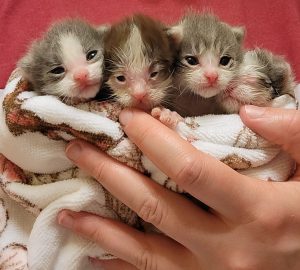A Guide for Getting Through Kitten Season
Article Written by Staff Member Shelby Dowdell with the help of Staff Hannah Schramm, Heath Hershman and Alleycat.org
The goal of the below article is to educate the community about what kitten season truly means on a much larger scale. Whether it be your neighbor feeding unfixed strays, kittens/cats getting dumped on your property, or even finding kittens in unfamiliar places, all of us are bound to experience a situation like this in our lifetime. Hopefully, this article helps you better understand how to handle one of those situations. It may be your chance to save a kitten or cat’s life.
Kitten season is a term we use to describe the spring season that most male and female adult cats mate. Female cats are able to start reproducing as young as six months old, meaning even kittens can have kittens. With a gestation period of about 60 days, cats become pregnant multiple times in a single year, leading to health issues for both mom and her kittens. That is why it is important for our community to work together and get the outdoor cats of our neighborhoods spayed/neutered. As an organization we understand that during kitten season, finding kittens is a scenario that seems inevitable. So what do you do?
Many times well meaning people will jump the gun and take kittens from their hiding places when they happen upon them. What may seem like an odd place to a person coming across kittens, areas such as holes in trees, under porches or in bushes are the perfect hiding space for a mother cat to keep her newly born kittens hidden and protected.

The below information posted originally from www.alleycat.org helps explain what you can and should do when you stumble upon a kitten or kittens:
“When you discover kittens outdoors, it can be tempting to scoop them up and bring them indoors. However, it is important to know that this is almost never in a kitten’s best interest. So, what exactly do you do?”
Kittens Younger than 8 Weeks WITH Their Mother:
Leave them be! Kittens who are healthy and thriving with their mother outdoors do not need to be “rescued.”
Remember: Mother knows best. You cannot replace a mother cats’ instinctive care. Plus, neonatal kittens (kittens 4 weeks old and younger) need round-the-clock care to survive—which is challenging for humans to provide. These kittens are unweaned, meaning they still rely on their mother’s milk.
Why Can’t I Bring the Kittens AND Their Mother Indoors?
Even if your home is very nice, a mother cat may become so stressed by being confined in the new environment that it impacts her health and her ability to care for her kittens.
Community cats thrive in their outdoor home and the mother cat has likely chosen an ideal space to raise her kittens, so there is no need to intervene.
How CAN I Help Mother Cat and Kittens While They are Outdoors?
You can’t do a mother cat’s job, but you can make her more comfortable as she cares for her kittens outdoors. Provide her with essentials like:
- Regular food and water. A nursing mother cat can always use some extra wet food so she can keep providing necessary nutrients to her kittens.
- An outdoor shelter. Mother cats like to raise their kittens in nests, where they feel hidden and protected. An outdoor shelter is a perfect safe space. You can purchase one or build one yourself.
- Peace and quiet. Keep an eye on mother and kittens, but don’t approach or let dogs or other cats come near. Doing so will cause her stress.
What if the Kittens Are in Danger?
If a kitten is sick or injured, contact your local veterinarian right away if your kittens show these signs:
- Thin bellies, gaunt faces, visible ribs/spine
- Cold ears, bellies, and paws
- Pale gums and tongue
- Lethargy/almost no movement
- Excessively crusted eyes or nose
- Diarrhea or vomiting
- Struggling to breathe
- Limping
- Visible wounds or sores
- Crying out in pain
There may be rare circumstances in which the kittens’ current environment places them in immediate danger. This is not a common scenario, so use common sense. For example, kittens may need to be removed if they are in an area that is about to be flooded or is close to a fire.
- If possible, move the kittens to another outdoor spot as close to their original nest as is safe so their mother can find them.
If you believe mother and kittens are in more long-term danger, such as extreme weather or disaster conditions:
- Bring the whole family inside to a quiet, small room (like a bathroom). You can also use a large dog crate, covered with a blanket.
Provide the mother cat and kittens with a carrier as a hiding place. Provide food and water, and a litter box placed as far away from the sleeping and eating area as possible.
Kittens Younger than 8 Weeks WITHOUT Their Mother:
- First and foremost: Do not assume that kittens are abandoned or orphaned just because you do not see their mother. A mother cat will temporarily leave her kittens for good reasons, like looking for food. She may even be hiding and waiting for YOU to leave.
- Wait and watch. Always wait several hours, or even a full day to see if a mother cat returns. Watch from a hidden spot or from inside so you don’t scare the mother cat away. Your presence may keep her from returning to her kittens’ nest.
Even if you don’t see the mother cat for a long time, check on the kittens periodically. If they are cuddled together and sleeping quietly, look pink, warm, and clean, and have full bellies, then their mother has very likely been back. You just didn’t notice. Community cats are good at staying out of sight when they want!
(A Helpful Tip: Sprinkle flour near the kittens’ nest. If the mother cat returns, she will leave paw prints.)
- If you have waited for several hours or more than a day and have reason to believe the kittens’ mother is no longer around, step in to help them. Neonatal kittens (kittens 4 weeks old and younger) will need special supplies and round-the-clock care to survive.”
If you follow these steps and determine there is something wrong, there are many resources available for learning how to feed these little guys and keep them warm and cared for until a foster can be secured. You can network with local veterinarians and rescues but please do understand that with kitten season there are never enough hands, so if you are willing and able please consider keeping these guys yourself if you can until a space opens up.
Hopefully, this article can be used as a tool for you when or if you find yourself in any of the above situations.





